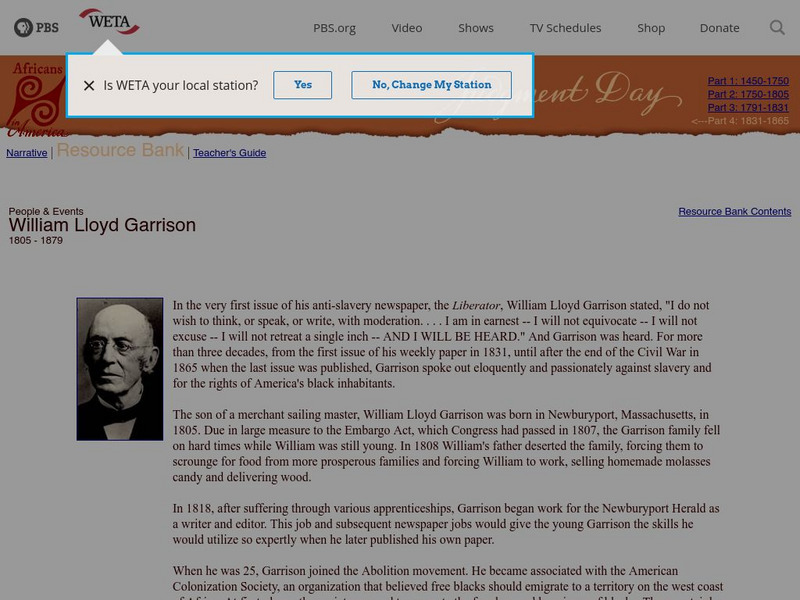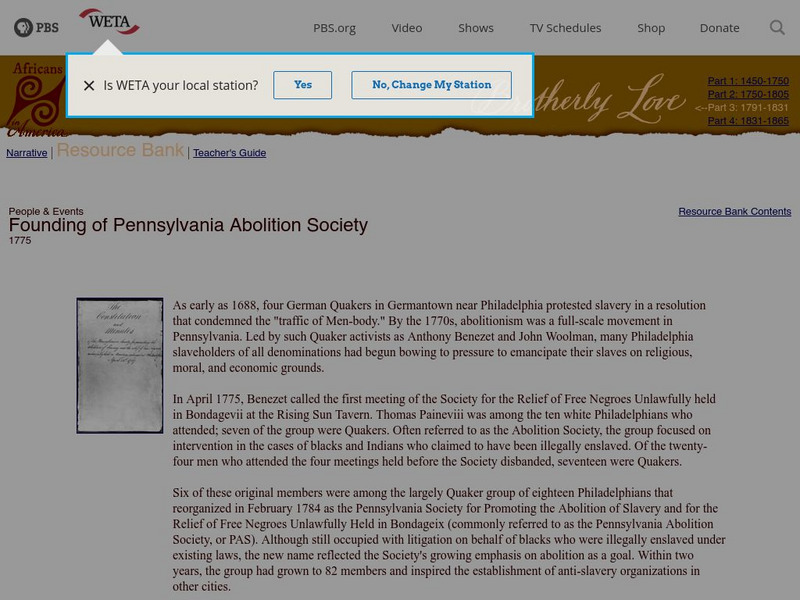Curated OER
Learning About Life as a Slave
Students explore the history of slavery. In this slavery lesson plan, students take a closer look at slavery in the Americas and the abolitionist movement as they visit the suggested museums and their websites.
Curated OER
Looking at Human Struggle Through The Language Arts Curriculum: The Faces of Slavery
Sixth graders examine the use of slavery in the United States. Using a map, they draw the route of the Tecora and Amistad voyages. Individually, they write an essay describing their opinions on whether the Africans on the ships should be...
James Madison Memorial Fellowship Foundation
Those "Other Rights:" The Constitution and Slavery
Did the United States Constitution uphold the institution of slavery, or did it help to destroy it? Young historians study Article 4, Section 2, Clause 3 of the Constitution and evaluate the rights of slaveowners as they compared to or...
Curated OER
Jackie Steals Home
Students read articles relating to Jackie Robinson's breaking of the racial barrier in professional baseball. This leads to a deeper exploration of racism in the United States. They use a variety of worksheets imbedded in this plan to...
Curated OER
Abolishing Slavery
Learners explain the goals and methods of the abolitionist movement.
They identify key leaders in the movement. This lesson has adaptations for elementary through high school. Links are provided for resource readings.
Curated OER
The Life of Frederick Douglass
Students discuss the importance of effective leadership in a democratic society. They study the significance of the contributions of Frederick Douglass to America. They compare the effects of political, economic, and social factors on...
Curated OER
The Patchwork Path
Fourth graders investigate slavery by reading a book with their classmates. In this abolitionist movement lesson, 4th graders read the story The Patchwork Path, and discuss the creation of the Underground Railroad. Students create...
Curated OER
The Literature of Upheaval
In groups, 8th graders read different documents and answer questions on the Civil War period. Students read documents by Thoreau, Stowe and Frederick Douglas.
Curated OER
Frederick Douglas
Fourth graders explore the African Americans resistance to slavery. In this US History lesson, 4th graders read excerpts of a speech by Frederick Douglas.Students develop a position of right or wrong to certain situations within their...
Curated OER
Frederick Douglass: This is Your Life; The Abolitionist
Seventh graders study the abolitionist movement in antebellum America.
Curated OER
The Unfinished Lincoln Memorial
Students develop a list of images of President Abraham Lincoln: for example, self-taught youth, great debater, advocate of abolition of slavery and assassinated hero. They must determine if these images of Lincoln stand up under scrutiny.
Curated OER
Americans Who Stood Up for Their Beliefs
Students will reflect upon the use of music to teach lessons throughout history. The focus of the study is based upon early American History. The tie of music and the abolition of slavery makes for interesting inquiry for learners.
Curated OER
The Role of the Connecticut Abolitionists with the Amistad Case
Tenth graders compare the activities of the Underground Railroad with the Amistad Case. In this slavery lesson, 10th graders research primary and secondary sources to discover information about Connecticut abolitionists. Students use...
Curated OER
Fugitive Slaves and the Underground Railroad
Eleventh graders consider the impact of the Underground Railroad. In this slavery lesson, 11th graders examine primary documents as they conduct independent research to explore the role of the Underground Railroad during the fight for...
Curated OER
Slavery and the Legal Status of Free Blacks
Students examine the status of free blacks in Illinois and slavery in the U.S. They read and analyze primary source documents, answer and discuss questions, participate in a group discussion, and present the group's findings to the class.
Curated OER
Slavery and the Legal Status of Free Blacks: Rhetorical Analysis of Debates During the 1847 Illinois Constitutional Convention
Eleventh graders read actual arguments regarding the status of free blacks in Illinois and slavery in the United States more generally.
Curated OER
Sunken Millions: The Way West
Recover sunken treasure with this interactive PowerPoint! Break your class into two teams: the divers and the surfers. They'll work together to answer 20 multiple choice questions, reviewing major events that occurred during the 1800s....
PBS
African American History: Climbing the Wall
Imagine the challenge of trying to trace your family genealogy if no records were kept of births and deaths. Where would you look for information? What types of documents could provide you with the information you seek? History...
Curated OER
Working on the Railroad
Students view and discuss "The Transportation Revolution," a lecture by Peter A. Coclanis. They read and respond creatively to brief descriptions of railroad workers and their job responsibilities.
PBS
Pbs: God in America: The Black Church
A good look at the role of the church and religion in the history of African Americans. Find out the church's importance in the abolition movement and the civil rights movement.
Cornell University
Cornell University: Library: Abolitionism in America: Introduction
The introduction of an extensive website from the Cornell University Library, which includes text, documents, and other primary sources in an examination of the anti-slavery movement known as abolitionism.
PBS
Pbs: Cet: Africans in America: William Lloyd Garrison
Photo and biographical text included in this PBS site on William Lloyd Garrison. Part of a larger site linked to the series "Africans in America". Click on Teacher's Guide for teacher resources.
PBS
Africans in America: Founding of the Pennsylvania Abolition Society
A detailed account of the founding of the first Quaker abolitionist society in 1775 in Philadelphia by Anthony Benezet. The society became known as "PAS" or "Pennsylvania Abolition Society".
PBS
Pbs: Africans in America: David Walker (1796 1830)
At this site from PBS you can read about the life of David Walker. Born in the late 18th century as a free black, he was most known for his pamplet, entitled "Appeal," which advocated slave revolt.

























